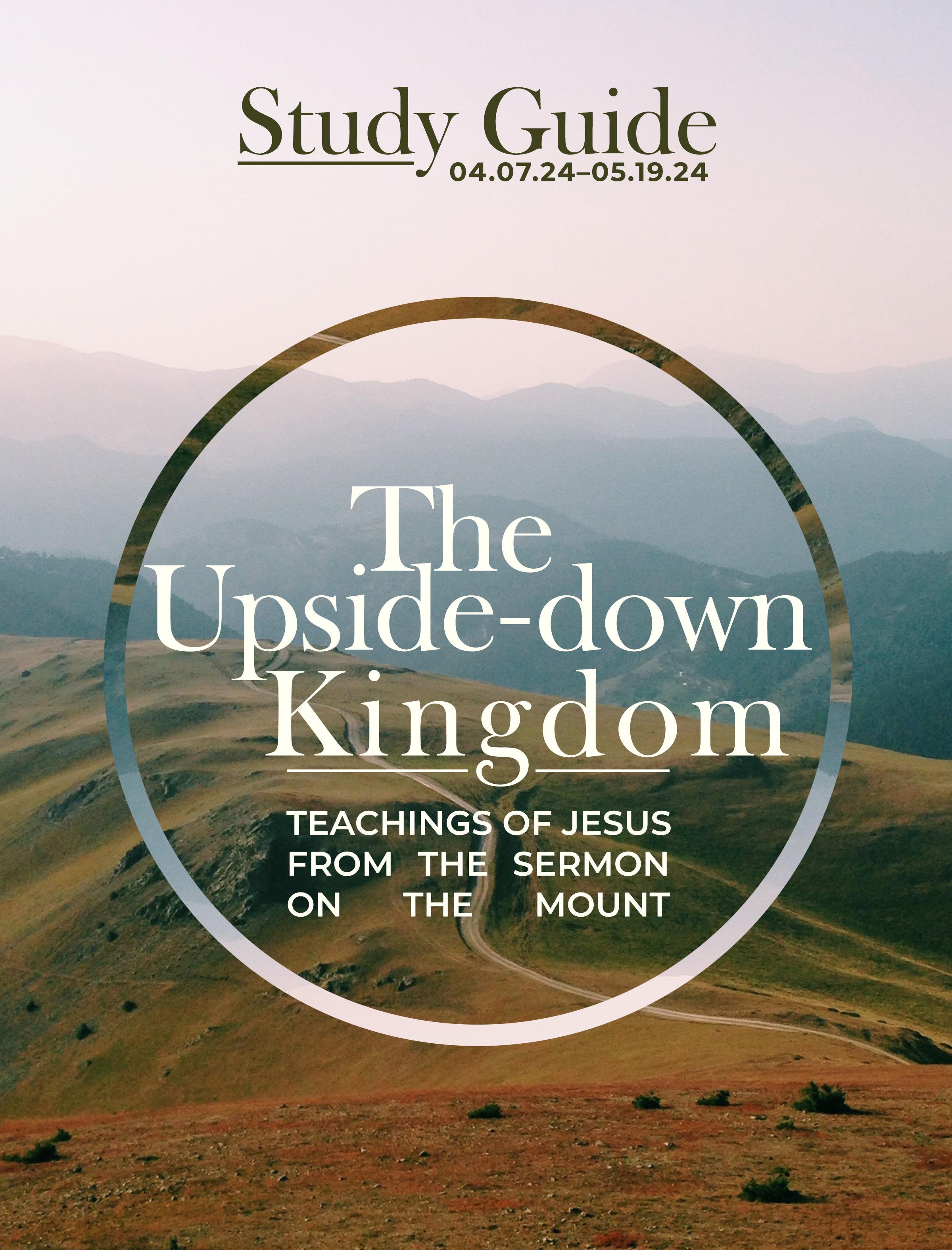

Watch past sermons online.
Welcome to The Sermon on the Mount Study Guide Part 2 which corresponds with the Upside-Down Kingdom Sermon series being taught on Sunday mornings at First Free Church. Sermons are available on our website.
This is a seven-week guide, for personal or group use, covering Matthew 5:17-47. Content for each week will include relevant cultural background information, insights on central ideas or key themes, and questions to think through and meditate on. As always, we encourage you to prayerfully and carefully read (or listen to) Matthew 5-7 as often as you can throughout this series so that you never lose sight of the larger section of scripture that the smaller section you’re studying lies within.
As you interact with this guide, we’d encourage you to let the corresponding Sermon on each section of scripture serve as the supplemental backdrop for your personal study. Listening to the messages as you use the study is highly encouraged. Keep in mind that the sermon series will not always line up with the study guide, both in terms of the preaching schedule and the specific content presented.
We’ve included some resources that we’ve found helpful. In our own study of these passages, we’ve discovered that some of the things Jesus said are either difficult to understand or hard to apply especially in our context because we are so far removed from his first audience. But don’t let that stop you from diving in and seeing how each passage challenges us today with fresh insights and application!
1
Helpful Resources
If you have questions or want to investigate further, we recommend any of the following resources:
• Online Resources for Deeper Study
- Bible Project Podcast Study of Sermon on the Mount (new content released regularly) Scan the QR code!
- Consider ordering Jen Wilken’s Sermon on the Mount study with video access on Amazon
• Commentaries Used to Create this Guide (all citations refer to these):
- The Story of God Bible Commentary, Sermon on the Mount by Scot McKnight
- The IVP Bible Background Commentary, New Testament by Craig S. Keener
- Matthew, Zondervan Exegetical Commentary on the New Testament by Grant Osborne
• Helpful Study Bible notes worth exploring when you get stuck (3 different translations)
- ESV Study Bible
- NIV Zondervan Study Bible
- CSB Study Bible

3

Open with Prayer
Read Matthew 5:17–20
This section begins a transition in Jesus’ teaching. He addresses a question that many faithful Jewish people wrestled with: How are they to live righteously amid their Covenant relationship with God?
The Bible Project offers a helpful summary of key points:
• Jesus has come not to get rid of what is taught in the Old Testament, but to reveal God’s intended purposes, namely that the instructions of God (aka the law) point to the fulfiller of the law—Jesus the ultimate authority (5:17).
• God’s Word will outlast the most enduring thing we know such as the sky and the earth (5:18).
• Every command in the law, from the least to the greatest, is important. And to be great in God’s kingdom is to honor all of it (5:19).
• Jesus calls his followers to be even more faithful to the law than even the Pharisees, but in a way that some might find surprising (5:20).
Jesus didn’t want people to abandon the teachings of the Old Testament. He wanted to teach people how to live out the greatest and the least of the commandments in light of Jesus. Thus far in Matthew, he hasn’t yet elaborated. He gets to this in what follows in Matthew 5. This is a great reminder to read everything within its own larger context, so as often as possible, read the entire Sermon on the Mount, and even better, read the entire book of Matthew as often as you’re able as we’re studying this together as a church. We highly recommend rewatching Danny’s message “The Law” before answering the following questions.
4
WEEK 11 | MATTHEW 5:17–20
Questions:

What is your current understanding of the Old Testament Law to which Jesus is referring in this section? (Check out this short explainer video if you don’t know much about the Law
https://bibleproject.com/explore/video/law/ )
Read Matthew 22:34-40. What two things does Jesus eventually say sum up the whole Law?
During his life and ministry, Jesus is accused of being lax especially about the Sabbath law. How does he respond to these accusations (Matt. 12:9-14)? What does that have to do with this section?
How does Jesus perfectly fulfill what he says in Matthew 22:34-40?
Jesus is about to expand on what it looks like to live righteously according to the law in his kingdom (the rest of the Sermon on the Mount), and he seems to say that it’s important for his followers to live in a manner that aligns with his teachings. What thoughts/feelings come up for you when thinking about whether you are living in a way that aligns with what Jesus is teaching here?
5
1 2 3 4 5
Close in Prayer

Open with Prayer
Read Matthew 5:21–26
This section (and the following five that begin with “you have heard it said...”) is where Jesus begins to expand on his view of the Law.
This is where he calls his followers to be even more faithful to the law than the Pharisees. Some English translations will use the word “but” as the transition word between “you have heard it said,” and “I tell you.” This makes it feel like Jesus is contradicting the law, telling his followers that it no longer applies. But if we keep smaller sections of the Bible in their larger contexts, we remember Jesus had just finished saying “For I tell you, unless your righteousness surpasses that of the scribes and Pharisees, you will never get into the kingdom of heaven.”
So, Jesus is not contradicting the Law, but showing that outward fulfillment of the Law isn’t the full extent of what he’s come for. He shows that outward behavior begins in the heart. And we know how much harder it is to conquer our heart motivations than to control our outward behavior. New Testament scholar Scot McKnight says, “...in this section {Jesus} enters into the heart of the ‘murderer’ and condemns the anger and revenge that precipitate murder. Instead of anger, the aim—the transforming initiative—is reconciliation with others.” (McKnight, 77).
6
12
MATTHEW
WEEK
|
5:21–26

Questions: Close in Prayer
Verses 21-22 pair actions with judgements. What is surprising about the statements that Jesus makes here?
In verses 23-26, Jesus offers “counter behaviors that illustrate what it means to live both beyond anger and in reconciled relations with others. His words are an Ethic from Beyond, that is, the kingdom appearing partially in the now” (McKnight, 79). What connections do you see between Jesus’ call to a life of radical reconciliation and his earlier words in Matthew 5:9?
Why is it that we can be sure that Jesus is not undoing the Law with his statements here? (i.e. what happens to the outward behavior prohibited by the Law if he is targeting the heart?)
Do Jesus’ statements about anger still apply today? Why or why not?
Read verses 21-22 again. Are there certain people, or groups of people to whom you are tempted to direct your intense anger or even call fools? This type of anger towards others, even though it might not feel like you’re going to murder someone, degrades God’s image in them, and should be a call to reflection and repentance for a follower of Jesus. How can you/we be reconciled?
7
1 2 3
4 5

Open with Prayer
Read Matthew 5:27–30
“The cultivation of our character is a deeply personal activity, but it never is private because it never just affects us. It will spill over into how we treat people, and in this case, how men regard women.”-Tim Mackie, The Bible Project
While God’s law expressly forbade adultery for both men and women (Exod. 20:14, Lev. 20:10-12), we know that the many men in Israel did not follow this law and often took multiple wives or used women as sexual slave surrogates to have more children. Now, in the Greco-Roman society that Jesus lived in, it was widely culturally acceptable for a husband to have multiple sexual partners in addition to his wife. It was not, however, acceptable for a married woman to have any sexual encounters with anyone other than her husband and if she was found out, she was likely to be killed (McKnight, quoting 2nd Century text, pg. 86). Jesus once again calls his followers to the highest degree of holiness and love (back to following the Law as they should have been doing all along.) Notice that Jesus does nothing to blame the figurative woman who has become the object of desire. This is not her problem. That only externalizes the sin, and that is the very thing Jesus is working to show, that sin begins internally, and always moves its way outward, eventually affecting others in harmful ways. In verses 29-30, Jesus calls his followers to radical internal/personal repentance that honors the dignity of women/other humans and does not place the blame for one’s sexual desire anywhere outside oneself.
According to this passage, Jesus is speaking directly to men addressing the cultural acceptance of men having the freedom to sin against women by taking multiple sexual partners or spouses. While the strong warning for men remains today, women can also read this text and hear a call toward sexual holiness as well. No one is freed from the call to not sexually objectifying another human being or finding sexual fulfilment outside the marriage relationship of a husband and wife. Every human is made in the image of God, and as followers of Jesus, we should relate to our fellow humans as brothers and sisters, full of holiness and love for one another.
8
13 | MATTHEW
WEEK
5:27–30
Questions:

Read Job 24:15 and Proverbs 30:20. How is adultery described?
Read James 1:15. How does this correlate to what Jesus is saying here?
How does Jesus describe lust? With a sin such as lust, why is it important to remember that the problem cannot be fixed by blaming external things or blaming others?
This can be an incredibly painful topic to discuss or even think about, for both men and women. There is a lot of shame and heartache attached to this area of sin, and we want you to know that there is hope and healing available. Ministries such as “Rethinking Sexuality” by Juli Slattery, Pure Desire Ministries, (https://firstfreelincoln. org/personal-purity/) and others are available. Please don’t hesitate to reach out for help. Through Jesus there is forgiveness and healing. Take the next step.
What is God inviting you to do with what you have discovered today?
9
1 2 3 5 4
Close in Prayer

Open with Prayer
Read Matthew 5:31–32
31 “It has been said, ‘Anyone who divorces his wife must give her a certificate of divorce.’
32 But I tell you that anyone who divorces his wife, except for sexual immorality, makes her the victim of adultery, and anyone who marries a divorced woman commits adultery.” (NIV)
It’s easy to read Jesus’ words here through our own current cultural lens, or through our own personal experiential lens and forget that he was addressing a particular debate that was happening in real time between people in his own circles. It was a popular question circulating at the time, “on what grounds can we divorce our wives?” The Law given through Moses permitted divorce only by the husband if he “finds something indecent about her” (Deut. 24:1). Some interpreted “something indecent” to mean sexual immorality, while others interpreted this to mean anything they found displeasing, even to the point of just finding another woman more pleasing than their own wife (ZECNT, 200).
Once again, Jesus calls his followers to a life of higher holiness and love than even the religious leaders were debating. He expands his statements in Matthew 19:1-12. Marriage is a covenant relationship that should not be entered into lightly, and he was calling men (and women) to not forgo faithfulness to their spouses as easily as the culture around them would allow them to. Through talking about the reasons for divorce, Jesus is highlighting the magnitude of a committed relationship between a husband and wife.
In talking about the importance of a lifelong commitment to marriage, we are deeply grieved that this passage has been used to encourage women to stay quietly in abusive marriages. We encourage women who find themselves in abusive relationships to immediately seek help and protection.
In our day and age, when marriage is just as easily ended as it is begun by both men and women, we could think about Jesus reminding us to be faithful to one another as he is faithful to us. Covenant loyalty to one another is the holy and loving calling in marriage.
10
14 | MATTHEW
WEEK
5:31–32

It’s hard to make it through adulthood (or even childhood for many) without being touched by divorce. Make room for any feelings or thoughts that come up for yourself or for others. Invite the Holy Spirit to work in and through your heart right now as you contemplate something that could be potentially very painful.
Read Matthew 19. How does Jesus expand his statements in Matthew 5:31-32?
If you are married, how does thinking about God being faithful to you help you long for faithfulness in your marriage to your spouse?
If you are single, how does Matthew 19 encourage you to consider marriage carefully?
If you have experienced or are going through a divorce, there is hope and healing available to you. You are not alone! Please consider joining DivorceCare. Scan to join.

11
1 2 3 4
Questions: Close in Prayer
5

WEEK 15 | MATTHEW 5:33–37
Open with Prayer
Read Matthew 5:33–37
In Matthew 5:33-37, Jesus provides a summary of Old Testament teaching on oath-making (Exod. 20:7; Lev. 19:12; Num. 30:2; Deut. 23:21-23). Oaths are vows or a means of stating something as factual/truthful, namely by calling on God as a supporting witness. Here are a few contemporary examples, “As the Lord will testify, I promise you will be the first person I call when I hear something about my job interview” or “God knows this is true, I swear that I didn’t take the last donut”.
According to Grant Osborne oath-making was a common cultural practice in the ancient world (ZECNT, 204). Jesus appears to be concerned with general oath-making practices and how they were being overly applied to everyday statements and situations, perhaps falsely, using God as a means of justification. More importantly, Jesus is concerned about what is behind the oath itself. By way of addressing oath-making norms, Jesus appears to say that it is rather simple – no need for elaborate oaths, just be honest and make sure your words have integrity. Just let your yes be yes and your no be no.
12
Questions:

Read Matt. 5:33-37 and James 5:12. Ponder oaths that were aimed at heaven, earth, Jerusalem, and the head. What do all these have to do with God and oaths - what do we learn about God’s nature and calling on God as a witness in our oath-making through these statements?
What does the phrase “don’t use God’s name in vain for personal gain” mean? What does this statement seek to protect us from or lead us away from? Consider Matt. 5:37 and the role of evil one in your response.
Dramatic oath-speaking practices may not be common in normal conversations today, however making empty or worthless promises/proclamations can be perceived as relatively common. In what ways does Jesus’ teaching on oaths help steer you toward alternative ways of living?
How might our relationships improve by applying this teaching, and where does forgiveness and grace need to be experienced/extended as you examine how you or others live out this teaching of Jesus?
13
1 2 3 4
Close in Prayer

Open with Prayer
Read Matthew 5:38–42
Jesus quotes from the Old Testament justice law that can be found in Exodus 21:24 and Leviticus 24:20. These laws do sound harsh and vindictive, but it’s important to note that they forbade personal vengeance, encouraging those who had been injured to take their problems to the court to seek justice. And the eye for an eye decree limited the amount of punishment someone could receive, ensuring that the punishment fit the crime, so to speak. Injuries and injustice toward one another would be met with justice.
Then Jesus speaks here, calling his followers to a life of extreme love for their neighbor. His original audience was living under oppressive Roman rule, and Jesus uses four tangible examples of how his followers could respond to evil not with evil but with extreme love and generosity.
• Verse 39: A blow on the right cheek was “the most grievous insult” in the ancient world” (Keener, 59). therefore Jesus was calling his followers to a highly non-violent life and even asking them to surrender themselves to further insult by offering the other cheek as well.
• Verse 40: Exodus 22:25-26 gave the poor the right to keep their cloak even if someone sues them for essentially the shirt off their back. They would use their cloak not just as a coat but also for bedding and comfort. Here Jesus calls his followers to give not just their shirt, but also their cloak, essentially finding themselves with nothing, and the one suing them with everything.
• Verse 41: Roman soldiers could force civilians to carry their heavy loads, literally for 1000 steps. Here Jesus calls his followers to not just resist, but to go double the distance. Simon of Cyrene was asked to live this calling out when soldiers forced him to carry Jesus’ cross on the road to Golgotha (Matthew 27:32, Mark 15:21). This was a call for radical non-resistance to what would have been seen as the epitome of oppressive evil power.
• Verse 42: Giving to the poor was a high value in their culture (Deut. 15:7-11, Matt. 6:1-4) and Jesus ends this section with a reminder that his followers are to be marked not by self-focused vengeance but by selfless generosity.
All these can be summed up with two thoughts. First from Jesus, “Love your neighbor as yourself,” even if your neighbor is someone you consider ‘evil.’ And Paul says in Romans 12:21, “Do not be overcome by evil, but overcome evil with good.” As followers of Jesus, ultimately, we know that Jesus took all injustice upon himself, bearing the weight and burden on our behalf. We don’t need to seek out vengeance for ourselves, but we can live radically generous and humble lives as followers of our humble king Jesus.
14
16 | MATTHEW
WEEK
5:38–42
Questions:

Jesus never calls his followers to live in a way that he did not or would not live perfectly. Read Isaiah 50:6-7 and Matthew 26:47-56, 67; 27:24-56. How do you see Jesus exemplifying his call to non-resistance, humility, and even radical generosity?
Are there appropriate times to fight back through resistance or retaliation? How does this passage make us think twice about how we answer this question?
What are some ways we can think about “offering the other cheek,” today? Since being slapped is not the grievous insult now that it was in Jesus’ day (although hopefully no one is getting slapped at all today!), what would be a cultural equivalent way to “turn the other cheek” for us?
Going the extra mile might be easier to consider on a personal level, but it was an oppressive governmental rule that Jesus was asking his followers to not only comply with but go far beyond expectations. What does this suggest for you in how you engage people relationally or socially, especially with people you disagree with? How about politically—important question to ask during an election season?
How can we be people marked by radical generosity personally and as a church?
What is God inviting you to do with what you have discovered today? Take the next step.
15
1 2 3 4
Close in Prayer
5 6

WEEK 17 | MATTHEW 5:43–47
Open with Prayer
Read Matthew 5:43–47
It is interesting that Jesus says that you’ve heard it said that we are to love our neighbors and hate our enemies. The first part of this statement doesn’t strike us as off knowing what Jesus has taught about the subject of loving neighbors. On the flip side, the second part does raise an eyebrow. You might ask, does the Bible teach us to hate our enemies?
Jesus is addressing a common belief that has crept into the mindset of those he is speaking to, either via a misrepresentation of Old Testament teaching or via the influence of pop culture through people circulating a popular consensus opinion. Either way, Jesus provides an alternative view—love your enemies (not hate them) and pray for those who persecute you. The words that follow dramatically reinforce what loving our enemies looks like, asking for our enemies to be blessed by God as God cares for them as well as us. The teaching of Jesus reveals God’s heart for all people, even our enemies.
16
Questions:

The passage says, “love your enemies.” Several practical questions naturally emerge from this phrase: Who are my actual enemies and what does it look like to love them? Look at Matt. 5:43-47 again; identify who the enemies might be based on what that passage reveals.
What does being a child of God have to do with loving our enemies? What is this passage revealing about God’s character and his posture toward all people in creation (v. 5:45).
Why do you think the passage ends with an exhortation to be perfect? Is it a conclusion of this specific teaching or to all the topics just preached about by Jesus? Most importantly what is Jesus ultimately trying to say about how we should live considering who God is?
At First Free Church we hold to numerous values. Check out our “What We Believe” page and consider what values might be related to living out what Jesus teaches in Matt. 5:43-47.

Lastly, when you consider those who are your enemies, when was the last time you prayed for them? Take a few minutes to pray for your enemies asking God to send metaphorical sunshine and rain on them as a gracious form of blessing despite their evil or unjust ways. What we Believe
17
Close
1 2 3 4 5
in Prayer







